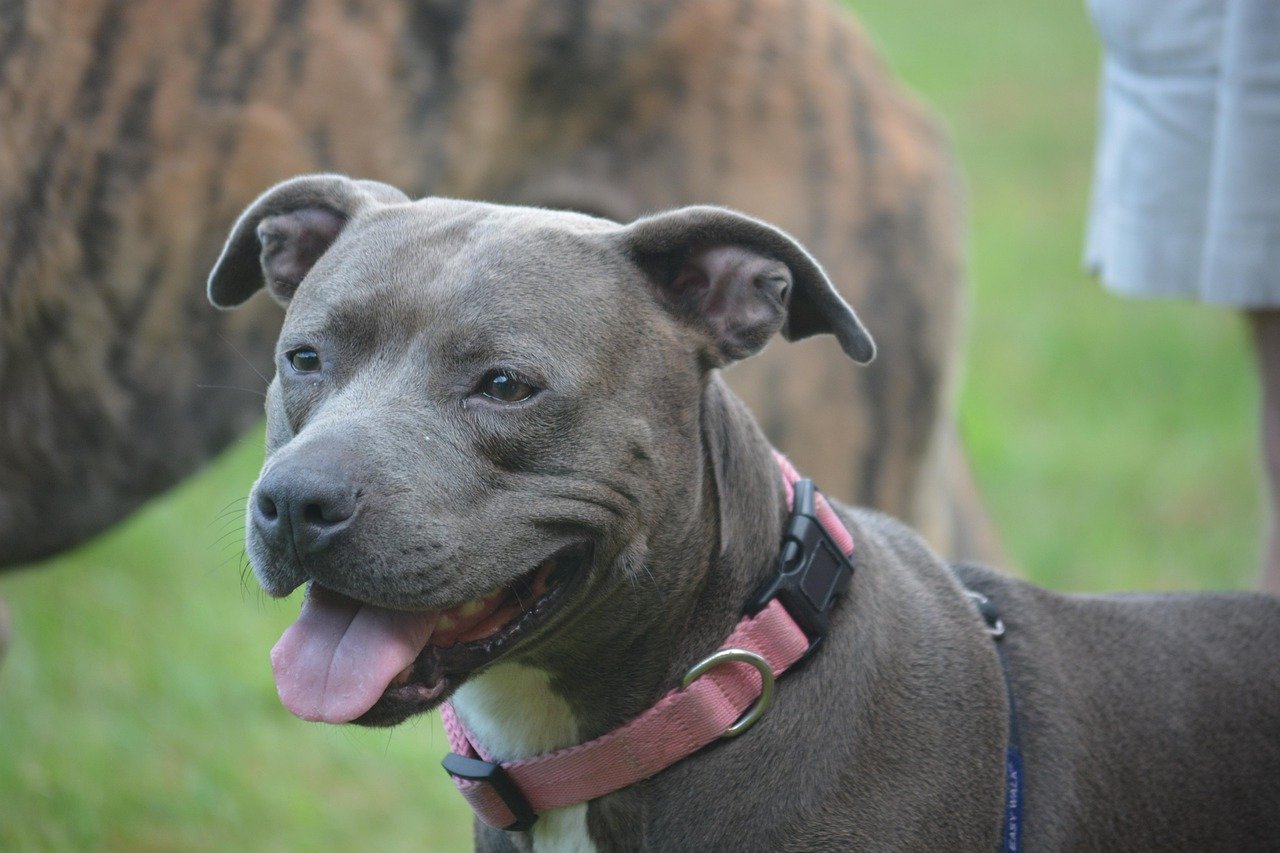Have you ever seen a Staffie’s tail wag so hard it looks like it might take flight? There’s something undeniably heart-melting about these muscular, wide-grinned dogs that turns even the most hardened heart into mush. For decades, Staffordshire Bull Terriers—lovingly called Staffies—have been misunderstood, often painted with an unfair brush. But in reality, these loyal companions are big-hearted, snuggly, and gentle giants with an endless craving for affection. If you’ve ever wondered why Staffies are so famous for their cuddles and clownish smiles, get ready to fall in love all over again.
The Misunderstood Reputation of Staffies

It’s almost shocking how quickly people judge Staffies based on their tough looks. Many folks assume that their muscular build means they’re aggressive or dangerous. In truth, Staffies are among the sweetest and most people-loving dogs you’ll ever meet. Unfortunately, stories and myths from the past have cast a long shadow, often overshadowing their kind nature. This reputation mostly stems from irresponsible ownership and media exaggeration, not from the dogs themselves. Those who live with Staffies know there’s nothing scary about them—unless you’re afraid of getting licked too much! If you take time to meet a Staffie, you might just find yourself face to face with a dog who wants nothing more than to be your best friend. It’s a powerful lesson about not judging a book—or a dog—by its cover.
Why Staffies Are Known as “Nanny Dogs”

There’s a reason people used to call Staffies “nanny dogs.” In the past, families trusted these dogs to watch over young children. Their patience, gentleness, and protective instincts made them the perfect playmate and guardian. Staffies are naturally drawn to kids, often showing remarkable tolerance for clumsy hugs and noisy games. Unlike some breeds that shy away from rough-and-tumble play, a Staffie will happily be in the thick of it, tail wagging with joy. Parents used to say that a Staffie would rather take a gentle squeeze from a toddler than leave their side. While no dog should be left unsupervised with small kids, Staffies’ loving nature makes them a wonderful family companion. Their reputation as “nanny dogs” is a badge of honor they still wear today.
The Staffie Smile: A Symbol of Joy

If you’ve ever seen a Staffie grin, you know it’s contagious. Their big, wide mouths curl up in a way that looks like they’re smiling at the world. This “Staffie smile” isn’t just adorable—it’s a sign of their genuine happiness and love for people. When they greet their favorite humans, Staffies often show off this trademark grin, sometimes paired with a full-body wiggle. It’s almost as if their joy can’t be contained! This smile is more than just a cute expression; it’s a window into their affectionate souls. Some people say a Staffie’s smile can chase away the darkest moods. If you’re feeling down, just spend a few moments with a Staffie, and you’ll walk away lighter, guaranteed.
Why Staffies Crave Human Affection

Staffies are famous for their need to be close to their people. Some might say they’re “velcro dogs”—once they bond with you, they want to stick by your side at all times. This craving for affection is deeply rooted in their history as companion animals. Unlike some independent breeds, Staffies have been bred for generations to love and rely on humans. They’ll often follow you from room to room, curl up in your lap (no matter their size), and nuzzle you for attention. It’s almost like they have a sixth sense for when you need a cuddle. For Staffies, being close to their favorite humans is as important as food and water. Their love is genuine, wholehearted, and sometimes a little overwhelming—but in the best way possible.
Gentle Giants: The Soft Side of Strength

Despite their strong, athletic appearance, Staffies are true gentle giants. They might look tough, but inside, they’re soft as marshmallows. Many Staffie owners are amused by how their burly pup transforms into a total baby at home. These dogs love belly rubs, ear scratches, and cozy blankets. They’re also famously sensitive to their owners’ moods—if you’re sad, don’t be surprised if your Staffie comes over to comfort you with a gentle nudge or a paw on your knee. Their strength isn’t just physical; it’s emotional, too. They have a way of making you feel safe and loved, no matter what life throws your way. It’s this mix of power and tenderness that makes Staffies truly unique.
How Staffies Express Their Love

Staffies have a whole toolkit of ways to show their affection. Besides their famous smiles, they’re known for enthusiastic greetings, wagging tails, and happy dances when you walk through the door. Some Staffies will lean against you or press their head into your lap, silently asking for a cuddle. Others will bring you their favorite toy, hoping for a game or a bit of attention. And then, of course, there are the “Staffie hugs”—they love to drape themselves across your lap or curl up as close as physically possible. If you’re lucky, you might even get a gentle lick on the cheek as a special treat. Each Staffie has their own unique way of saying, “I love you,” but they all do it with their whole heart.
The Importance of Socialization and Training
Like any dog, Staffies thrive when they’re properly socialized and trained from an early age. Their strong desire to please makes them quick learners, especially when positive reinforcement is used. Introducing them to a variety of people, places, and other animals helps them become well-rounded and confident. Consistent, gentle training helps Staffies understand boundaries while still feeling safe and loved. This socialization also helps to dispel any lingering myths about their temperament. When a Staffie is raised with kindness and clear guidance, they blossom into the affectionate, joyful companions they’re meant to be. Training isn’t just about obedience—it’s another way to build a strong, trusting bond with your Staffie.
Staffies and Play: A Match Made in Heaven

If you’re looking for a playful companion, Staffies are second to none. They have boundless energy and a real zest for life. Whether it’s a game of fetch, tug-of-war, or just a romp in the backyard, Staffies throw themselves into playtime with gusto. Their clownish antics can keep you laughing for hours. Play isn’t just fun for them—it’s also a way to bond and share affection. When a Staffie brings you a toy, they’re not just asking for a game; they’re inviting you into their world. Their playful spirit is infectious, often reminding us to loosen up and enjoy the simple things. With a Staffie, every day is an adventure.
Staffies as Therapy and Support Dogs

It might surprise some people to learn that Staffies make excellent therapy and support animals. Their gentle temperament, deep empathy, and unwavering loyalty make them perfect for helping people in need. Many Staffies work with children, the elderly, or people with emotional or physical challenges. They have a knack for sensing when someone needs comfort, and their affectionate nature helps soothe anxiety and lift spirits. Stories abound of Staffies bringing joy to hospitals, schools, and care homes, spreading love wherever they go. Their ability to connect with people on a deep level is nothing short of remarkable. If you’ve ever been comforted by a Staffie, you know just how healing their love can be.
Building a Lifelong Bond With Your Staffie

Owning a Staffie is like gaining a loyal friend for life. The bond you share isn’t just about daily walks or shared meals—it’s about mutual trust, love, and understanding. Staffies remember kindness, and they return it tenfold. They’ll be there for you through thick and thin, always ready to offer a snuggle or a goofy grin. Building this bond takes time, patience, and plenty of affection, but the rewards are endless. If you give a Staffie your heart, they’ll give you theirs without hesitation. For many dog lovers, that connection is the greatest gift of all.

Sumi Sarkar from India holds a B Tech degree in Information Technology, is a freelance film maker, scriptwriter, content editor who loves animals, especially dogs.






